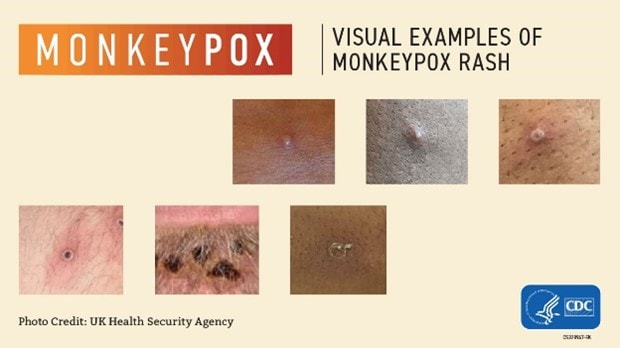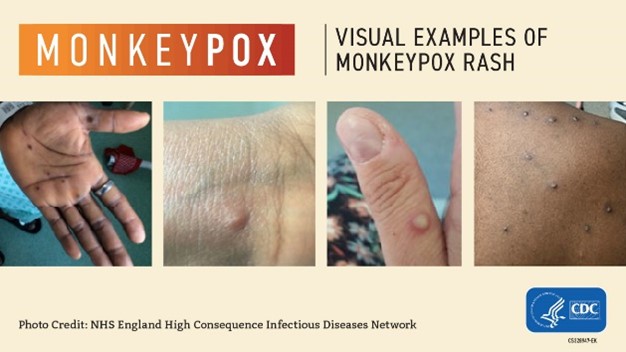Monkeypox (MPX)


There are numerous ways to protect yourself from MPX, including:
- Practice good hygiene
- Wash your hands often for at least 20 seconds
- Don’t share clothing, towels, bedding, utensils
- Avoid/minimize skin-to-skin contact
- Avoid direct physical contact with people who have symptoms like sores or rashes
- Get vaccinated if you meet the criteria – Contact San Benito County Public Health Services for vaccine eligibility.
- Talk to your partners about MPX symptoms; be aware of new or unexplained rashes or lesions
*MPX is not considered a sexually transmitted disease but is often transmitted through close skin-to-skin contact, which can include sexual contact.
If you had close direct contact with a person diagnosed with MPX, you may be eligible to receive the MPX vaccine. Contact San Benito County Public Health Services at (831) 637-5367 (Monday through Friday, 8:00 AM to 5:00 PM) for more information. Avoid sex or close contact with others. Avoid sharing clothing, towels, bedding, and utensils. At this time, testing for MPX is only available if you are experiencing rash/lesion symptoms.
Watch for signs and symptoms for 21 days after exposure.
Contact your primary care provider for testing options. Stay home and isolate away from others while you wait for results.
If you don’t have a primary care provider or are uninsured, contact San Benito County Public Health Services for testing options at (831) 637-5367 (Monday through Friday, 8:00 AM to 5:00 PM).
CDC recommends people who have been exposed to MPX and those who are at higher risk of getting MPX to get vaccinated. San Benito County Public Health Services has an extremely limited supply of the JYNNEOS vaccine. The JYNNEOS is a two-dose vaccine given 28 days apart and has been approved by the US Food and Drug Administration for Emergency Use.
San Benito County Public Health Services is following CDC and CDPH guidance on MPX vaccination strategies. Currently, there is not enough vaccines for all at-risk populations. In accordance with CDC and CDPH guidelines, doses allocated to San Benito County to date have been prioritized for individuals who have had close contact with a person diagnosed with MPX and individuals at highest risk of contracting MPX.
When MPX vaccine allocations increase, San Benito County Public Health will increase availability to additional CDC priority populations. We will share additional information as it becomes available.
For additional information regarding vaccine visit CDPH and CDPH Vaccine Q&A.
Most MPX infections are mild and do not require treatment. There is no treatment specifically for MPX. However, antivirals like tecovirimat (TPOXX) may be recommended for people who are at greater risk of severe illness. Talk to your healthcare provider about your symptoms.
MPX is a zoonotic disease, which means it can be spread between animals and humans. Humans can be infected with the virus through direct contact with infected animals and their fluids. Small mammals can carry the virus, sometimes without apparent symptoms. Infected animals can spread MPX to humans, infected people can spread MPX to animals through close contact like petting, cuddling, hugging, kissing, licking and sharing sleeping areas or food.
For more information on MPX and animals click Pets in the Home


